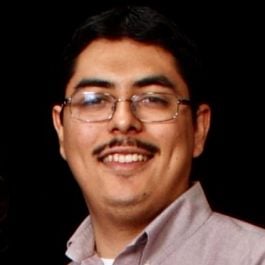In the world of finance, data scientists are often thought of as the Clark Kents of the office, punching in numbers all day and never showing themselves for the heroes they are — heroes that fight fraud and rescue customers from bad guys trying to steal their savings.
But not at PNC.
PNC’s mission is purpose-filled: protecting customers and their livelihoods. And the bank’s fraud team plays a critical role, as scammers increasingly leverage complex tactics and technologies to prey on the public trust in conducting theft.
The more information the PNC fraud team can collect, the better equipped they will be to understand how the scammers operate and anticipate their next move.
Enter PNC’s data scientists and engineers.
“We look at the data to see if something in it seems strange,” said Fraud Strategy and Analytics Senior Manager Arturo Briseno. “We look at the transactions in the aggregate. Within a pocket of weird activity, what attributes do we have that we can analyze? What do we know about all parties and actions involved? Is the party receiving the money associated with anomalous activity?”
Briseno says that banks like PNC have a treasure trove of data to analyze, and that the key function of a data analyst in the fraud space is to leverage this data to conduct pattern analysis.
The challenge is to be able to tell the good from the bad, and the scammers don’t want to make it easy. They put special effort into obfuscating their malicious activity. But this challenge makes for a dynamic environment as data scientists work to chase down the next move of the adversary and try to cut them off at the pass, according to Senior Data Scientist Andrew Burkhart, who works in the Enterprise Fraud Organization Act Team at PNC.
“Fraud is so varied, and fraudsters are so creative, so you are always developing something new. It can be fun and exciting. And PNC enables you to work with big data tools, so there’s just a ton of creativity involved in the job,” Burkhart said.
“Fraud is so varied, and fraudsters are so creative, so you are always developing something new. It can be fun and exciting.”
Burkhart worked in the PNC Customer Care Center while studying statistics in college with a specialization in machine learning. The day he graduated, he transferred over to the Enterprise Fraud Organization to apply the skills he learned through school. He has been in the EFO for six years, progressively working up the ladder. He started out as an entry-level business analytics specialist and is now in senior management.
“All the promotions I got were performance-based. I didn’t apply for anything. I really liked the people and was able to do exactly what I went to school for — machine learning. Fraud is very postured for career growth,” Burkhart said.
“All the promotions I got were all performance-based. I didn’t apply for anything. I really liked the people and was able to do exactly what I went to school for —– machine learning.”
Although his path started with a degree, Burkhart doesn’t think everyone needs to follow that same route. He explained that, while those working with data can benefit from education in data science, statistics and engineering, the most important thing to succeed in one of these roles is experience working with big data.
“Bring the ability to utilize the tools, and the team will be able to put you to work,” he said, adding, “and no day will be the same!”
In Briseno’s role at PNC, he works on an EFO Adapt team that he said does the “firefighting.” When there’s a fraud incident in progress, he is using analytics to try to evaluate the situation and mitigate the harm in real time. Burkhart takes a more strategic, long-range view of patterns and trends relating to fraud. For instance, there may be 100 fraud rules that will help track and verify a deposit, but fraudsters like to shift tactics and evolve techniques, so it becomes a game of tit-for-tat.
The end result of a hard days’ work is the satisfaction that comes when you protect a customer’s hard-earned savings without causing inconvenience — and keep that money out of the hands of scammers — all while getting to do work that you love.
“The perfect candidate is somebody who’s creative, who likes a challenge and working on varied use cases instead of the same thing every day; someone inquisitive and creative with a passion for learning and breaking down problems,” Burkhart said.







